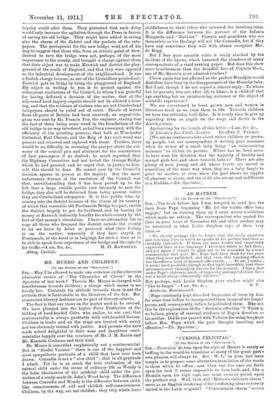MR. MUNRO AND CHILDREN.
To THE EDITOR OF THE " SFECTLTOR."
Srn,—May I be allowed to make one criticism on the otherwise admirable review of "The Chronicles of Clovis" in the Spectator of last week P Therein Mr. Munro is charged with heartlessness towards children; a charge which seems to me hardly fair. Certainly his attitude towards them is not the attitude that is fashionable in the literature of the day. But evanescent literary fashions are no part of literary criteria.
The fact is that our views on the matter need to be revised. We have plunged into the higher Peter Pantheism at the bidding of hard-headed Celts, who realize, to our cost, that sentimentality is always profitable with soft-hearted Saxons. Children in books and on the stage are treated with mercy not too obviously tainted with justice. And parents who have made school delightful to their sons and daughters senti- mentalize happily over the creatures of Mr. J. M. Barrie and Mr. Kenneth Grahame and their kind.
Mr. Munro is somewhat emphatically not a sentimentalist. But in " Sredni Vashtar " there is one of the happiest and most sympathetic portraits of a child that have ever been drawn. Conradin is not a "nice child "; that in all gratitude I admit. Yet he is as much the true realization of the natural child under the stress of ordinary life as Wendy is the false idealization of the artificial child under the pro- tection of a ready-made St. John's Wood faery. The difference between Conradin and Wendy is the difference between child- like consciousness of self and childish self-consciousness. Children, by a.° way, are not childish : they very wisely leave childishness to their elders who invented the insulting term. It is the difference between the portrait of the Infanta Margarita and " Bubbles." Parents and guardians who see themselves as the Darlings will not like Conradin, but if they have any conscience they will with shame recognize Mrs. de Ropp.
But I fear your amiable critic is really shocked by the incident of the hyaena, which harassed the slumbers of many correspondents of a staid evening paper. But does this show more heartlessness than the dreadful fate of Captain Hook, one of Mr. Barrie's most admired touches ?
Clovis again was not affected as the perfect Wendyite would doubtless have been by the disappearance of the Momeby baby. But I ask, though I do not expect a sincere reply : To whom but its parents, who are, after all, to blame, is a child of that age anything but an uninteresting nuisance or the object of scientific experiment ?
We are accustomed to treat grown men and women in literature much as we treat them in life. Towards children we have two attitudes, both false. It is surely time to give up regarding them as angels on the stage and devils in the draw log- room.
Apologizing for the length of this letter.—I am, Sir, &c.,
36 Lincoln's Inn Fields, London. E UaNE C. PERRIN.
[We are no sentimentalists about either children or grown- up people, but our correspondent is writing pure nonsense when he writes of a small baby being "an uninteresting nuisance" to all but its parents. Where has he lived never to have seen the devotion that the majority of healthy and normal girls feel and show towards babies: There are also plenty of men, young and old, whose hearts are moved in something of the same way when they see a baby laugh to greet its mother, or even when the pool shows no ripples of pleasure or alarm, and the child site serene and indifferent as a Buddha.—En. Spectator.]


















































 Previous page
Previous page